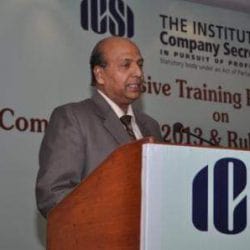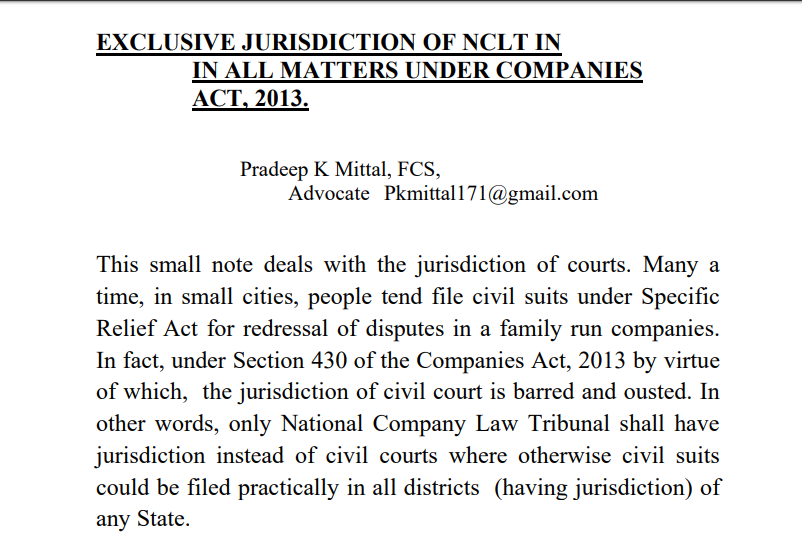Exclusive Jurisdiction of NCLT In All Matters Under Companies Act, 2013.
EXCLUSIVE JURISDICTION OF NCLT IN ALL MATTERS UNDER COMPANIES ACT, 2013.
This small note deals with the jurisdiction of courts. Many a time, in small cities, people tend to file civil suits under the Specific Relief Act for redressal of disputes in a family-run company. In fact, under Section 430 of the Companies Act, 2013 by virtue of which, the jurisdiction of the civil court is barred and ousted. In other words, only National Company Law Tribunal shall have jurisdiction instead of civil courts where otherwise civil suits could be filed practically in all districts (having jurisdiction) of any State.
2: The Division Bench of Madras High Court in the case of Viji Joseph Vs. P. Chander MANU/TN/1766/2019 says that in order to find out the scope, intent, the jurisdiction of NCLT under Section 241, we may have to look to various powers which could be exercised under Section 242 of Act. In other words, under Section 241, the jurisdiction of NCLT is exhaustive, diverse, expansive, and voluminous for which a wide variety of powers and what is the nature of those powers which could be exercised, have been spelled out under Section 242 by NCLT. The DB holds as under:
However, an election to the helm of affairs and to the post of office bearers by allegedly using other means would certainly come within the purview of mismanagement. It would become oppression when it goes against the interest of the company and the members including others, who complain. It would also amount to mismanagement as they involve a process of fraud and collusion affecting the management as a whole.
Section 242(h) of the Act also provides for the removal of the Managing Director, Manager, or any other Directors of the Company. As discussed above, to understand Section 241 of the Act, a little peep into Section 242 of the Act would be necessary.
We may also note that Section 242(k) of the Act also gives a larger power to the Tribunal in appointing such a number of persons as Directors. Therefore, the power of the Tribunal in giving effect to an order passed on a complaint under Section 241 of the Act is quite exhaustive, keeping in mind the interest of the company. After all, every provision of a statute has to be given its meaning and therefore, can never be ignored.
Section 424 of the Act, NCLT & NCLAT are given liberty to go beyond CPC by applying principles of natural justice and subject to other provisions governing. Thus, they are not bound by the Code, which is obviously a procedural one. They can also formulate their own procedure.
2: The DB of Madras High Court Viji Joseph and Ors. vs. P. Chander (supra) further holds that the NCLT and NCLAT are competent to exercise all the powers of the Civil Court and also decide the complex issues coming before them – which are otherwise decided by the Civil Court after detailed trial. It has been that under Sub Clause (2) of 424 of the Act, the Tribunals are vested with the powers of the Civil Court as conferred under CPC. Sub Section (3) gives sanctity to an order passed by the NCLT and NCLAT by elevating to it that of a decree. Sub Section 4 makes the position clear by deeming the Tribunal as a Civil Court though for the purpose of Section 195 and Chapter XXVI of the Code of Criminal Procedure.
3: The Delhi High Court in the case of Jaiveer Singh Virk vs. Sir Sobha Singh and Sons Pvt. Ltd. and Ors. (21.03.2020 – DELHI) : MANU/DE/0895/2020 has observed that once the Legislature in its wisdom has deemed it appropriate that if petitioners do not hold entitlement as prescribed under Section 244 of Companies Act, 2013 could not be permitted to initiate legal proceedings with respect to management and affairs of the company, it would be a travesty of law to hold that such petitioners who do not qualify under Section 244, though not entitled to approach the NCLT, can interfere with the management of affairs of the company by approaching the Civil Court. The Legislature has prescribed the minimum for exercising such a right, it has to be held that less than the said minimum, have no right to interfere in the management at all.
4: Further, the Delhi High Court has in Sir Sobha Singh and Sons Pvt. Ltd. (Supra) also taken cognizance of the judgment of the Supreme Court in the case of Ammonia Supplies Corporation (P) Ltd. Vs. Modern Plastic Containers Pvt. Ltd. MANU/SC/0585 wherein it was held that CLB could not go into the adjudication of disputed issues of title to the shares but recently the Supreme Court in Shashi Prakash Khemka Vs. NEPC Micon MANU/SC/0187/2019 has held that NCLT and NCLAT have exclusive jurisdiction in matters under Companies Act, 2013. In other words, impliedly the SC overruled its own previous ruling in the case of Ammonia Supplies Corporation (P) Ltd – which has been so observed by Delhi High Court in Sir Sobha Singh’s case.
5: In substance, by virtue of a judgment of the Supreme Court in NEPC Micon and followed in the latest judgment of Delhi High Court in Sir Sobha Singh, the NCLT has exclusive jurisdiction over all issues/matters arising under the Companies Act, 2013.
Related Topic:
NCLT in the case of Sunteck Realty Limited Versus Goodwill Theatres Private Limited
Download the copy:
 Advocate Pradeep Kumar
Advocate Pradeep Kumar
PK Mittal BCom Delhi university 1975 LLB Delhi University 1978 FCS Fellow Member of ICSI 1992 1982 to 1992 as CS in Corporate Head Legal Apollo Tyres Ltd 1986 to 1992 1993 onwards Advocate in Delhi High Court CESTAT NCLT = Practcising Indirect Tax and Corporate laws 1993 to till date. Written more than 100 Article on Company Law and Corporate laws Indirect Tax Speaker on Indirect Tax Co Law and IBC in various Seminars Workshop organised by ICAI ICSI and ICMA and other organisations Convenor Core Group on GST of ICSI








